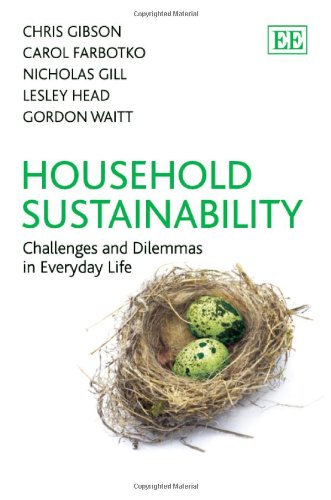

Most ebook files are in PDF format, so you can easily read them using various software such as Foxit Reader or directly on the Google Chrome browser.
Some ebook files are released by publishers in other formats such as .awz, .mobi, .epub, .fb2, etc. You may need to install specific software to read these formats on mobile/PC, such as Calibre.
Please read the tutorial at this link: https://ebookbell.com/faq
We offer FREE conversion to the popular formats you request; however, this may take some time. Therefore, right after payment, please email us, and we will try to provide the service as quickly as possible.
For some exceptional file formats or broken links (if any), please refrain from opening any disputes. Instead, email us first, and we will try to assist within a maximum of 6 hours.
EbookBell Team

5.0
50 reviewsContrary to the common rhetoric that being green is 'easy', household sustainability is rife with contradiction and uncertainty. Households attempting to respond to the challenge to become more sustainable in everyday life face dilemmas on a daily basis when trying to make sustainable decisions. Various aspects of life such as cars, computers, food, phones and even birth and death, may all provoke uncertainty regarding the most sustainable course of action. Drawing on international scientific and cultural research, as well as innovative ethnographies, this timely book probes these wide-ranging sustainability dilemmas, assessing the avenues open to households trying to improve their sustainability.
The authors engage critically, and constructively, with the proposition that households are a key scale of action on climate change. They confront dilemmas of practice and circumstance, and cultural norms of lifestyle and consumerism that are linked to troublesome environmental problems - and question whether they can be easily unsettled. The work also illuminates the informal and often unheralded work by households - frequently the poorest - in reducing their environmental burden. This important book is critical to understanding both the barriers to household sustainability and the 'unsung' sustainability work carried out by householders.
Containing a unique combination of science and cultural research, this fascinating book will appeal to researchers and students of environmental science, environmental studies, sustainability studies, climate change adaptation, geography, sociology, cultural studies, science and technology studies, as well as energy studies and housing research. Policy-makers in various levels of government working through sustainability problems, environmental educators, social planners and sustainability officers working for governments, will also find much to interest them in this unique book.
Contents: Introduction 1. Having a Baby 2. Spaghetti Bolognese 3. Clothes 4. Water 5. Warmth 6. Toilets 7. Laundry 8. Furniture 9. Plastic Bags 10. Driving Cars 11. Flying 12. The Refrigerator 13. Screens 14. Mobile Phones 15. Solar Hot Water 16. The Garden 17. Christmas 18. Retirement 19. Death 20. Conclusion References Index